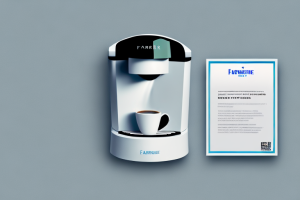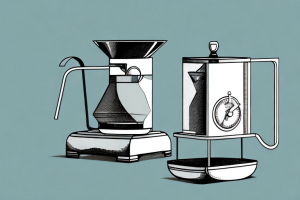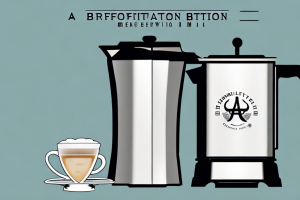Clean Coffee Maker Without Vinegar

A coffee maker being cleaned with a sponge and soapy water
As coffee lovers, we often rely on our trusty coffee makers to deliver that perfect cup of coffee every day. But did you know that your coffee maker needs regular cleaning to function optimally? In this article, we’ll explain why you should clean your coffee maker regularly and how to do it without vinegar.
Why You Should Clean Your Coffee Maker Regularly
The build-up of mineral deposits, coffee oils, and bacteria in your coffee maker can negatively affect the taste of your coffee. Not only will your coffee taste stale, but it can also become a breeding ground for bacteria, which can pose a risk to your health.
In addition, regular cleaning of your coffee maker can also extend its lifespan. The accumulation of mineral deposits and coffee oils can cause damage to the internal components of your coffee maker, leading to malfunctions and ultimately, the need for a replacement. By cleaning your coffee maker regularly, you can prevent these issues and save money in the long run.
The Dangers of Not Cleaning Your Coffee Maker
If you neglect to clean your coffee maker, it can become clogged with mineral deposits, which can lead to slower brewing times, weaker coffee, or overflows. Additionally, certain bacteria, such as coliforms and staphylococcus, can thrive in coffee makers and pose a health risk if they are not cleaned regularly.
Furthermore, not cleaning your coffee maker can also affect the taste of your coffee. Over time, the oils from the coffee beans can build up in the machine, causing the coffee to taste bitter or rancid. This can be especially noticeable if you use a drip coffee maker, as the water passes through the same filter repeatedly.
Regular cleaning of your coffee maker can also extend its lifespan. Mineral buildup can cause damage to the heating element, which can lead to costly repairs or the need for a replacement. By cleaning your coffee maker regularly, you can prevent this damage and ensure that your machine lasts for years to come.
How to Identify When Your Coffee Maker Needs Cleaning
If you notice that your coffee tastes off or that the brewing time has slowed down, it’s an indication that your coffee maker needs cleaning. You might also see visible signs of mineral build-up, such as white or brown spots in the water reservoir and coffee pot.
Another sign that your coffee maker needs cleaning is if you notice a strange odor coming from the machine. This can be caused by old coffee oils and residue that have built up over time. Additionally, if you have been using your coffee maker frequently, it’s a good idea to clean it at least once a month to prevent any bacteria growth.
Regular cleaning of your coffee maker not only ensures that your coffee tastes better, but it also helps to extend the life of your machine. To clean your coffee maker, you can use a mixture of vinegar and water or a specialized coffee maker cleaning solution. Be sure to follow the manufacturer’s instructions and run a few cycles of clean water through the machine after cleaning to remove any residue.
Tools and Supplies You Need to Clean Your Coffee Maker Without Vinegar
You can easily clean your coffee maker without vinegar by using a few household items. You’ll need baking soda, a cleaning brush or toothbrush, hot water, dish soap, and a soft cloth or paper towel.
One alternative to using vinegar for cleaning your coffee maker is using lemon juice. Lemon juice is a natural acid that can help break down any buildup in your coffee maker. Simply mix equal parts water and lemon juice and run it through your coffee maker as you would with vinegar.
Another option is using citric acid. Citric acid is a common ingredient in many cleaning products and can be found in powder form at most grocery stores. Mix one tablespoon of citric acid with one cup of hot water and run it through your coffee maker. Rinse thoroughly with hot water afterwards.
Step-by-Step Guide to Cleaning Your Coffee Maker Without Vinegar
First, mix one tablespoon of baking soda with one cup of hot water and stir until dissolved. Pour the mixture into the water reservoir of your coffee maker and run a brewing cycle. Once the cycle is complete, pour out the solution and fill the reservoir with clean water. Run another brewing cycle with just water to rinse the machine. Finally, wipe down the exterior of the coffee maker with a soft cloth or paper towel.
It is important to clean your coffee maker regularly to prevent the buildup of mineral deposits and bacteria. If you use your coffee maker frequently, it is recommended to clean it once a month. However, if you use it less often, you can clean it every two to three months.
If you prefer not to use baking soda, you can also clean your coffee maker with citric acid. Mix one tablespoon of citric acid with one cup of hot water and pour the solution into the water reservoir. Run a brewing cycle and then rinse the machine with clean water by running another brewing cycle. Wipe down the exterior of the coffee maker with a soft cloth or paper towel to finish.
Common Mistakes to Avoid When Cleaning Your Coffee Maker
One common mistake to avoid is using too much baking soda, as it can be abrasive and damage your coffee maker. Another is not rinsing the machine thoroughly after cleaning, which can leave a soapy or bitter taste in your coffee.
Additionally, it is important to avoid using harsh chemicals or bleach when cleaning your coffee maker, as they can leave harmful residues that can affect the taste of your coffee. It is recommended to use a mixture of water and vinegar to clean your coffee maker, as it is a natural and effective solution that won’t leave any harmful residues. Also, make sure to clean your coffee maker regularly, as a buildup of mineral deposits can affect the performance and taste of your machine.
Tips for Maintaining a Clean Coffee Maker for Longer
To keep your coffee maker in good condition, you should avoid leaving coffee in the pot for extended periods, as it can lead to bacteria growth. Always empty and rinse the pot after each use. Additionally, clean the coffee maker every one to three months.
Another tip for maintaining a clean coffee maker is to use filtered water instead of tap water. Tap water can contain minerals and impurities that can build up in the coffee maker over time, leading to clogs and decreased performance. Using filtered water can also improve the taste of your coffee.
Alternative Methods for Cleaning Your Coffee Maker Without Vinegar
Aside from using baking soda, you can also use citric acid, lemon juice, or hydrogen peroxide to clean your coffee maker without vinegar. Just be sure to rinse the machine thoroughly after using any of these alternatives to avoid residual flavors or odors.
Citric acid is a great alternative to vinegar for cleaning your coffee maker. It is a natural cleaner that can effectively remove mineral buildup and stains from your machine. To use citric acid, mix one tablespoon of citric acid with one cup of water and run the solution through your coffee maker. Repeat the process with clean water to rinse the machine thoroughly.
Comparing Vinegar-Free Solutions with Traditional Vinegar-Based Methods
While vinegar is an effective cleaning agent for coffee makers, it can leave a strong odor and taste behind. Using alternative cleaning solutions can help you avoid these issues while still achieving a clean coffee maker.
One popular vinegar-free solution for cleaning coffee makers is using citric acid. Citric acid is a natural and effective cleaner that can remove mineral buildup and stains from your coffee maker without leaving any residual taste or odor. Another option is using baking soda and water to create a paste that can be used to scrub the inside of the coffee maker. This method is also effective and leaves no residual taste or odor. However, it may require more effort and time compared to using citric acid or vinegar-based solutions.
How Often Should You Clean Your Coffee Maker?
We recommend cleaning your coffee maker every one to three months, depending on how frequently you use it. If you’re a heavy user, you might need to clean the machine more often.
It’s important to note that cleaning your coffee maker not only improves the taste of your coffee, but it also helps to prevent the growth of bacteria and mold. Neglecting to clean your coffee maker can lead to a buildup of mineral deposits, which can affect the performance of the machine and even cause it to break down.
When cleaning your coffee maker, be sure to follow the manufacturer’s instructions. Some machines require special cleaning solutions, while others can be cleaned with simple household items like vinegar and water. It’s also important to regularly replace the coffee filter and wipe down the exterior of the machine to prevent the buildup of dirt and grime.
Benefits of Using Natural Solutions for Cleaning Your Coffee Maker
By using natural cleaning solutions like baking soda or citric acid, you can avoid exposing yourself or your family to harsh chemicals found in traditional cleaning solutions. Plus, these alternatives are typically more affordable and readily available.
By following these tips and tricks, you can enjoy a better-tasting and cleaner cup of coffee every day.
Another benefit of using natural solutions for cleaning your coffee maker is that they are environmentally friendly. Traditional cleaning solutions often contain harmful chemicals that can harm the environment when disposed of improperly. By using natural solutions, you can reduce your carbon footprint and contribute to a healthier planet.



